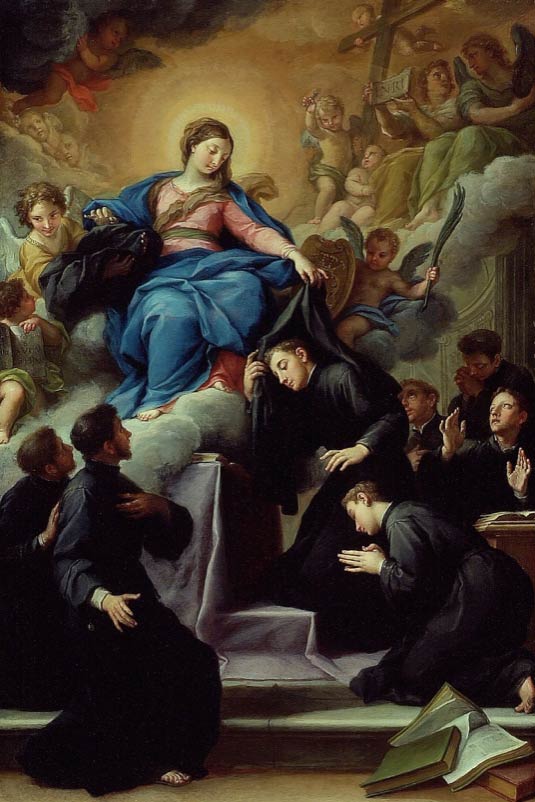Feast Day: February 17th (in 2021, Ash Wednesday trumps their celebration)
Florence, in the 1200s, is quickly becoming the richest and most powerful city on the Italic peninsula. It has begun minting its own currency, the Florin, which would dominate European markets for a century. But, the city is also divided. The city’s most famous inhabitant, the poet Dante, would be exiled from his beloved city at the end of this century for his membership in the losing sect of the white-Guelphs. It would take centuries of street fighting, then bull-fighting, and now horse racing (the bi-annual palio still sends 10 horses careening around the central piazza of the city every year) to keep all the various sections of the city civil with each other.
But, we’re here to meet seven gentlemen: Alexis, Amadeus, Hugh, Benedetto, Gherardino, Boufiglio, and Giovanni. If you did not know Florence was in Italy, their names might seal the deal! They are middle-aged merchants in Florence: two with families, two already widowers, the rest still leaving behind (or perhaps very content staying in) their well-to-do youth. They are Christians from their Italian heritage, but living during the morally troubled, heresy ridden, mid-1200s (probably a heresy you haven’t heard much about: Catharism – basically saying that our bodies are bad. This comes around under different forms every century or two, and has been very wrong ever since … oh, when God created us “very good”…). They are members of a guild of cloth merchants, which has made them friends, and made them traders of the wool fabric Florence was famous for.
They could have just as well become renowned and rich like another cloth merchant, Francesco Bernardone, almost did in Assisi just 50 years before. But, as the Magna Carta becomes the law of the land in England (1215); as the Mongols sweep in from Asia, defeating cities across Russia (1223), demolish Hungary and Poland (1241), capture Baghdad (1258), and threaten all of Europe; and, as Thomas Aquinas writes his Summa Theologicae (1265), our Lady chose these men for a very different path.

They decided to join a spiritual guild, the Confraternity of the Blessed Virgin – what we might now call a men’s-group – joining their friendship by religious, not merely mercantile, bonds. They were guided by a holy priest, (maybe a Dominican priest, Pietro of Verona, who would later be martyred by those heretical Cathari) in any case his role was quickly overshadowed by advice from someone rather closer to God: our Mother Mary. She appeared to these seven normal, working, but praying men, and called them to the same thing she knows is essential for all of us: prayer, penance, perseverance in the faith.
They could have done that as merchants, maybe. But as they drew closer to God, and meditated more and more on the 7 sorrows of Mary, they found Florence to be louder, and less wholesome, and less rich than it seemed before. Piles of florins do not seem nearly as glamorous when God offers you heavenly treasure; business relationships seem pretty shallow when the Lord offers you His mother; and the busy-ness and delights of 13th century Florence paled in comparison to the offer of doing God’s work.
And so, they began a penitential life. They provided for their families – however much that entailed – and then eventually formed a community and built a hermitage out in the mountains outside the city. They took up the black habit, the rule of St. Augustine, and became the Servites.
They also became saints.
– Fr. Dominic Rankin has been entrusted with the work of chaplain of our diocesan men’s group, the Legion of Valor now for almost 2 years. It is such awesome work to care, and lead, and pray with dozens of great men and fathers from around the diocese. We pray morning prayer together every morning. Many of the men see each other regularly in small-groups around the diocese. And we all join together in brotherhood and formation at least quarterly. That all sounds ordinary, but the same things made the seven-holy-servite-founders saints. Interested?: https://valor.dio.org/